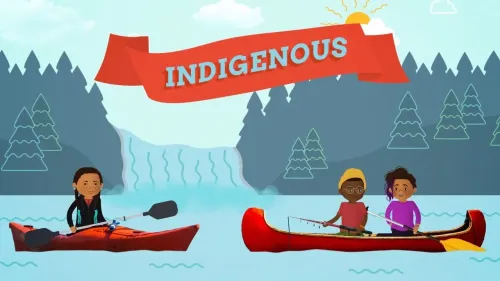
### Summary
The video transcript provides an educational conversation about the meaning and significance of the term “Indigenous” in the context of Canada. Indigenous people are described as the original inhabitants of a place, with a history in Canada spanning over 12,000 years, predating the country itself. The term “Indigenous” is preferred over older terms like “aboriginal,” “native,” or “Indian,” which are less commonly used today and can sometimes be offensive. Canada’s Indigenous population comprises three main groups: the First Nations, the Métis, and the Inuit, each with distinct cultures, languages, and histories. The First Nations are the largest and most diverse group, including over 50 different nations and languages such as Algonquin, Cree, Haida, Mohawk, and Ojibwe. The Métis are descendants of both First Nations peoples and European settlers, while the Inuit inhabit Arctic regions. The video emphasizes the rich cultural contributions of Indigenous peoples to Canadian society, including language, inventions, and traditions such as the canoe and kayak. Additionally, it highlights that the name “Canada” itself originates from the Iroquois First Nations word “kanata,” meaning village or settlement. The video advises using the specific nation’s name when known, or the general term “Indigenous” if not.
### Highlights
– 🌍 Indigenous peoples are the original inhabitants of Canada, living there for over 12,000 years.
– 🏷️ The preferred term is “Indigenous” rather than outdated or potentially hurtful terms like “aboriginal” or “Indian.”
– 🧩 Canada has three main Indigenous groups: First Nations, Métis, and Inuit.
– 🗣️ The First Nations alone include over 50 nations, each with distinct languages and cultures.
– 🚣 Indigenous cultures contributed inventions such as the canoe and kayak to Canadian society.
– 🏞️ The name “Canada” comes from the Iroquois First Nations word “kanata,” meaning village.
– 🔤 When possible, use the specific nation’s name to identify Indigenous people, otherwise use “Indigenous.”
### Key Insights
– 🌱 **Definition and Importance of “Indigenous”**: Indigenous means originating naturally in a particular place, emphasizing the deep-rooted connection Indigenous peoples have to their land. This connection is foundational to understanding their identity, history, and rights. Recognizing this term correctly helps foster respect and awareness in multicultural societies like Canada.
– 🏛️ **Historical Presence and Continuity**: Indigenous peoples have inhabited what is now Canada for over 12,000 years, long before the establishment of modern Canadian borders. This longevity highlights the importance of their history in shaping the land and culture long before European colonization. It also underscores the need to acknowledge Indigenous sovereignty and heritage.
– 🧑🤝🧑 **Diversity within Indigenous Peoples**: The Indigenous population is not monolithic but rather highly diverse, comprising First Nations, Métis, and Inuit groups, each with unique histories, languages, and cultural practices. This diversity calls for nuanced approaches to policy, education, and cultural preservation that respect and reflect these differences.
– 🔤 **Language as a Cultural Pillar**: With over 50 distinct languages spoken among First Nations alone, language is a crucial element of Indigenous identity and cultural survival. Efforts to revitalize and protect these languages are essential to maintain Indigenous knowledge, traditions, and worldviews. It stresses the need for educational programs and legal protections for Indigenous languages.
– 🛶 **Cultural Contributions to Canada**: Indigenous peoples have significantly influenced Canadian culture, contributing inventions such as the canoe and kayak, and even the country’s name. Recognizing these contributions challenges dominant historical narratives and acknowledges Indigenous peoples’ ongoing role in shaping national identity.
– 🏷️ **Respectful Terminology and Identity**: The video stresses the importance of using respectful terminology. Using specific nation names when known honors individual identities and histories, while “Indigenous” serves as a respectful umbrella term. Avoiding outdated or offensive terms fosters inclusivity and shows cultural sensitivity.
– 🌐 **Broader Implications for Education and Awareness**: This content reflects a broader societal need to improve education about Indigenous peoples, their history, and their cultures. Raising awareness and understanding helps combat stereotypes, promotes reconciliation, and supports Indigenous rights and recognition in contemporary Canada.
This comprehensive overview not only informs viewers about the meaning and diversity of Indigenous peoples in Canada but also encourages respectful language use, appreciation of Indigenous cultures, and recognition of their enduring legacy and contributions.
